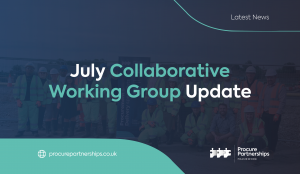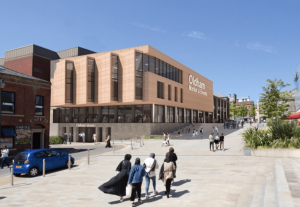In construction, success hinges not only on the quality of materials and workmanship but also on the efficiency of the procurement methods.
Procurement routes play a key role when it comes to determining how construction projects are delivered, impacting everything from cost and timeline to risk allocation and collaboration.
At Procure Partnerships Framework, we are dedicated to providing insights, guidance, and resources, offering a range of procurement routes to support and tailor to public sector clients in construction procurement.
Continue reading this article to explore the definition of procurement routes, the different routes available, and how to choose the right route for you.
Whether you’re a procurement professional, project manager, or stakeholder involved in public-sector procurement, we will provide you with the knowledge and tools you need to achieve your goals effectively.
What Is a Procurement Route in Construction?
Before we delve into the specifics of procurement routes, let’s explore what procurement routes for construction involve. A procurement route in construction refers to the method or approach by which a construction project is organised, contracted, and delivered. It encompasses the entire process, from the initial stages of planning and procurement to the final completion of the project.
Procurement routes determine how various tasks and responsibilities are distributed among project stakeholders, including clients, contractors, designers, and consultants.
Different procurement routes offer unique advantages and challenges. Some factors to consider when choosing the right route include your project objectives, complex projects, budget, timeline, and risk allocation preferences.
Ultimately, the choice of procurement route significantly impacts the success and outcomes of construction projects. This means you must carefully evaluate your options and choose the route that best aligns with your project requirements and objectives.
Common procurement routes include traditional procurement, design and build, framework agreements, single-stage procurement, two-stage procurement, and direct award.
Each route has its own unique characteristics, benefits, and considerations, influencing aspects such as:
- Cost certainty
- Collaboration
- Risk construction management
- Project efficiency
The Role of Procure Partnerships Framework
The Procure Partnerships Framework is a collaborative procurement initiative designed to streamline the delivery of public sector construction projects in the UK.
Acting as a collaborative procurement initiative, it offers a flexible and efficient approach to procurement, providing access to pre-qualified contractors and consultants across various regions and project types.
Public sector clients can benefit from reduced procurement timescales, cost savings, and increased project certainty.
The framework offers a range of procurement routes tailored to meet diverse project needs, optimising efficiency, collaboration, and innovation in the delivery of construction projects – from initiation to completion.
Exploring Contractor Procurement Routes
Within the Procure Partnerships Framework, there are several procurement routes available – each of which caters to different project needs and priorities.
Traditional Procurement
This route follows a sequential process where the design is completed before contractors are invited to tender. It offers clarity and certainty regarding project scope but may result in longer delivery times.
Design and Build
The client appoints a single contractor responsible for both design and construction. Design and build procurement can speed up project delivery and streamline communication. However, they may limit client involvement throughout the design phase.
Single-Stage Procurement
This route involves procuring both design and construction services simultaneously. It can expedite project delivery and encourage collaboration between designers and contractors from the outset.
Single-stage procurement can take over 10 weeks from initiation to award with Procure Partnerships.
Two-Stage Procurement
Two-stage procurement allows for early contractor involvement during the design phase, enabling cost certainty and risk mitigation. It enables collaboration and innovation while providing the opportunity for value engineering.
The two-stage procurement process can take over 6 weeks from initiation to award with Procure Partnerships – unless you opt for our express option, which is much quicker (without compromising on compliance!)
Direct Award
Direct award is a procurement method that offers a quick and compliant route to market, where a contract is awarded to a supplier without competitive tendering.
This method is often used when there is a single suitable supplier or for contracts under pre-approved frameworks, cutting the need for competition enables projects to commence on time within the set schedule.
This is our quickest route, which can take just two days from initiation to award.
Selecting the Right Procurement Route
Choosing the appropriate procurement route requires careful consideration of various factors, including project complexity, budget constraints, timeframes, and risk tolerance.
Public sector clients collaborating within the Procure Partnerships Framework can benefit from expert guidance and support in selecting the most suitable route for their specific needs.
Benefits of Procurement Routes within the Procure Partnerships Framework
The procurement routes offered within the Procure Partnerships Framework present numerous benefits for public sector clients:
- Efficiency: Streamlined procurement method reduces administrative burden and accelerates project delivery.
- Cost Savings: Competitive pricing and cost certainty help optimise project budgets and achieve value for money.
- Risk Management: Procurement routes offer flexibility in risk allocation and mitigation strategies, enhancing project certainty and resilience.
- Collaboration: Opportunities for early contractor involvement and integrated teamwork foster collaboration, innovation, and knowledge sharing.
- Quality Assurance: Access to pre-qualified contractors and consultants ensures high standards of workmanship and compliance with regulatory requirements.
Partner With Procure Partnerships Framework Today
When it comes to construction procurement, selecting the right procurement route is essential for delivering successful projects on time and within budget. Within the UK public sector, the Procure Partnerships Framework offers a comprehensive suite of procurement routes tailored to meet the diverse needs of clients and stakeholders.
Partnering with the Procure Partnerships Framework today offers unparalleled benefits for public sector organisations in the UK construction industry. Utilise our framework’s expertise, resources, and collaborative procurement approach to:
- Streamline project delivery
- Reduce costs
- Increase project certainty
Gain access to a pre-qualified pool of contractors and consultants, along with a diverse range of procurement routes. You can tailor your approach to meet your specific requirements and goals.
With a commitment to efficiency, innovation, and sustainability, partnering with the Procure Partnerships Framework ensures successful outcomes for construction projects, driving positive impact and value for stakeholders and communities alike.
For more information or to get in touch with us, just email or call us at info@procurepartnerships.co.uk or 0333 577 7575. Still unsure which procurement route best suits your project? Take our 2-minute quiz here!



